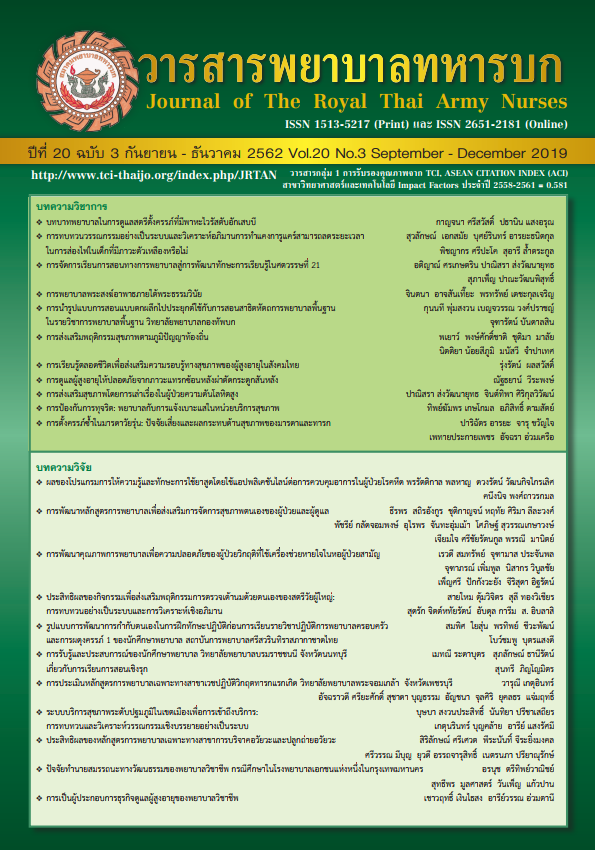Effect of Self- Efficacy Promoting Program on Self- Efficacy and Safety Behavior of Caretaker among Pre-School Children in Low Income and Multiple Deprived Families
Keywords:
self- efficacy promoting program, safety behavior, pre-school children, low income familiesAbstract
This quasi-experimental one-group pretest – posttest research aimed to compare self-efficacy and safety behavior of caretaker among pre-school children in low income and multiple deprived families study before and after of self- efficacy promoting program. Simple random sampling with inclusion criteria was used to recruit a sample of 30 caretakers who are living in Bangkok. The instruments used in this research include a demographic questionnaire, self- efficacy of the caretaker questionnaire, and safety behavior of the caretaker questionnaire. All instruments had content validity. The Cronbach’s alpha reliability of the questionnaires was .90 and .86 respectively. Data were analyzed by using descriptive statistic and t-test with statistical significance at .05.
The results found after the program showed that mean score of self- efficacy and safety behavior of caretaker among pre-school children were higher than before the program with a statistic significant (t30 = 5.23, p < .001 and t30 = 5.23, p < .001 respectively). These findings suggest that nurses and other health policymakers relating to child safety could apply this self- efficacy promoting program to build up policies protecting home child’s injuries in low income and multiple deprived families.
Downloads
References
2. Plitponkarrnpim A, Ketchaikosol C, Klommek J, Tiwaree C, Krikajornkitti S, Rodsonjai N, Chongcharoenthawonkul B, Nimkul M. Health risks and health outcomes among children in low income and multiple deprived families, 2018. (in thai)
3. Hick R. Material poverty and multiple deprivations in Britain: the distinctiveness of multidimensional assessment. Journal of Public Policy. 2015;36(2):277–308.
4. Office of the National Economic and Social Department Board. Report on the situation of poverty and inequality in the country in B.E. 2559 (2016 A.D.). (in thai)
5. Siamrath Newspaper. Child safety decade, B.E. 2553 (2010 A.D.). (in thai)
6. Hockenberry MJ, Wilson D, editors. Wong’ essentials of pediatric nursing. 9th ed. St. Louis: Elsevier/Mosby. 2013.
7. Klommek J, Chaimongkol N, Flick LH, Deenan A, Wongnum P. Predictors of unintentional home injury in toddlers: empirical testing of a causal model. Pacific Rim Int J Nurs Res. 2015;19(4):345-58.
8. Phelan KJ, Khoury J, Xu Y, Liddy S, Hornung R, Lanphear BP. A randomized controlled trial of home injury hazard reduction: the HOME injury study. Arch Pediatr Adolesc Med. 2011;165(4):339-45.
9. Bandura A. Self-efficacy: the exercise of control. New York: W. H. Freeman. 1997.
10. Chasri D, Pookboonmee R, Orathai P. Effect of self-efficacy promotion on caregiver’s confidence of participation in child care before discharge from pediatric intensive care unit. Journal of The Royal Thai Army Nurses.2018;19(3):234-242. (in thai)
11. Tanajaroenchananchai R, Pongjaturawit T, Chaimongkol N. Effects of the perceived self-efficacy promotion program on maternal confidence to perform nasal irrigation for children with retained nasal secretion. The Journal of Faculty of Nursing Burapha University. 2014;22(2):28-38. (in thai)
12. Rungrojwattana W, Kompayak J, Punthasee P. The effects of self-efficacy and family support promotion program on overweight among junior high school students. Journal of The Royal Thai Army Nurses. 2019;20(1):274-284. (in thai)
13. Hayeese W, Sap-In N, Pichaisongkram S. Chaimongkol N. Effects of the perceived self-efficacy promotion program of caregivers on quality of life of muslin preterm infants in Naradhiwas province. The Journal of Faculty of nursing Burapha University. 2016;24(2):51-60. (in thai)
14. Konchaiw N, Nirattharadorn M, Buaboon N, Sanguanklin N. Effects of a self-efficacy promotion program and husband participation on the repeated pregnancy prevention behaviors among adolescent mothers. Journal of The Royal Thai Army Nurses. 2018;19 (Supplement):326-335. (in thai)
15. Ministry of Public Health. Developmental Surveillance and Promotion Manual (DSPM). Nonthaburi: Ministry of Public Health. 2019. (in thai)
16. Plitapolkarnpim A. Learning media to prevent accidents in early childhood, for medical Personnel, public health, and early childhood caregivers. Bankkok: Hollywood Printing. 2561. (in thai)
17. Sriprachote S, Tanwattanakul J, Tangpukdee J. Effects of parent self-efficacy and outcome expectation promotion program on weight control among preschool children with obesity. Journal of Nursing and Health Care. 2018;36(1):164-71. (in thai)
18. Butchan P, Chamusri S, Singhala K. Effects of breastfeeding promoting program on family members self-efficacy and breastfeeding promotion behavior in community. Journal of Nursing and Health Care. 2016;34(4):97-105. (in thai)
Downloads
Published
How to Cite
Issue
Section
License
บทความหรือข้อคิดเห็นใดใดที่ปรากฏในวารสารพยาบาลทหารบกเป็นวรรณกรรมของผู้เขียน ซึ่งบรรณาธิการหรือสมาคมพยาบาลทหารบก ไม่จำเป็นต้องเห็นด้วย
บทความที่ได้รับการตีพิมพ์เป็นลิขสิทธิ์ของวารสารพยาบาลทหารบก
The ideas and opinions expressed in the Journal of The Royal Thai Army Nurses are those of the authors and not necessarily those
of the editor or Royal Thai Army Nurses Association.






